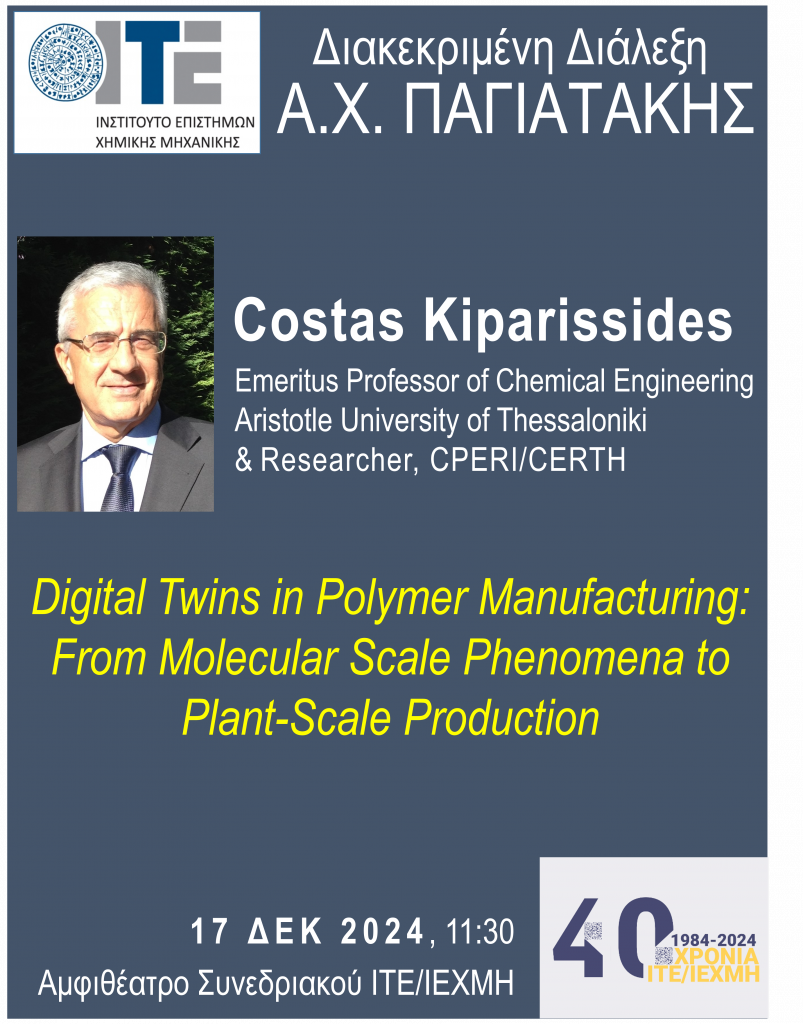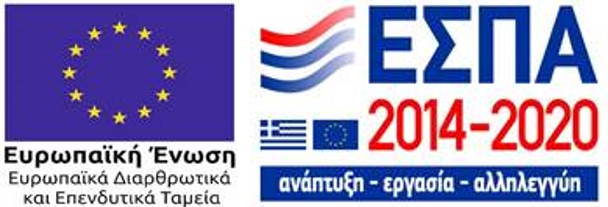Alkiviades Ch. Payatakes Distinguished Lectures
“Alkiviades Ch. Payatakes” Distinguished Lectures are organised every year by the Institute of Chemical Engineering Sciences of the Foundation for Research and Technology – Hellas (FORTH/ICE-HT), in Patras, to honor the memory of Alkiviades Ch. Payatakes (1945-2009), Professor at the Department of Chemical Engineering, University of Patras, Director of the Institute of Chemical Engineering Sciences of FORTH (1999-2006), and Chairman of FORTH from 2006 until his premature loss, on the 29th November 2009.
On the occasion of the first anniversary of his death, a Symposium to honor the memory of Alkivides Ch. Payatakes was organized by FORTH/ICE-HT and the Department of Chemical Engineering, University of Patras on December 17, 2010. The Symposium included scientific talks by his colleagues, his students and his friends in the areas of Particulate systems; Multiphase flows in porous media; and Transport phenomena in porous media and biological processes, as well as, memorial talks. Participants of the Symposium received an album, entitled “Alkiviades Ch. Payatakes: His life and his work, 1945 – 2009” (in Greek) written by his students. During the Symposium the building of FORTH/ICE-HT which was completed when he was Director of the Institute was named “A. C. Payatakes Building”.
Keynote speakers of the “Alkiviades Ch. Payatakes” Distinguished Lecture series are internationally recognized scientists.
“Alkiviades Ch. Payatakes” Distinguished Lecture 2024
Digital Twins in Polymer Manufacturing:
From Molecular Scale Phenomena to Plant-Scale Production
Costas Kiparissides 1,2
1 Chemical Process & Energy Resources Institute, Centre for Research and Technology Hellas,
2 Department of Chemical Engineering, Aristotle University of Thessaloniki, Greece

Abstract
The Laboratory of Polymer Reaction Engineering (LPRE) at CPERI/CERTH has developed a number of advanced, powerful, flexible, adaptive design software tools for the design, simulation, parameter and state estimation, optimization and control of polymerization processes. The developed software tools can be used in the simulation of a wide range of polymerization mechanisms, reaction media and reactor types, including: (i) Catalytic solution and slurry-phase olefin polymerization, (ii) Catalytic gas-phase olefin (co)polymerization in continuous stirred beds and fluidized bed reactors, (iii) High-pressure polyethylene tubular reactors and autoclaves, (iv) Suspension Polyvinylchloride (sPVC) reactors, (v) Emulsion (co)polymerization reactors, etc.
According to the established digital polymer manufacturing technology, a number of dynamic models describing the complex physical and chemical phenomena, occurring at different length and time scales, are linked together to simulate the effects of process operating conditions and selected reactor configuration on the molecular, morphological, rheological and mechanical properties of manufactured polymers. The developed process simulators comprise a number of computational sub-models including: (i) Comprehensive kinetic, thermodynamic and mass and heat transfer models coupled with macroscopic energy, mass balances and population balance models. (ii) The derived differential-algebraic equations are numerically integrated to provide detailed information on polymer quality (i.e., molecular weight distribution (MWD), long-chain branching (LCB), short-chain branching (SCB), copolymer composition distribution (CCD), chain sequence length distribution (CSD), bivariate molecular weight–copolymer composition distribution (MW-CCD), etc. and morphological polymer properties (i.e., particle size distribution (PSD), pore size distribution.). (iii) Advanced rheological models for the prediction of the viscoelastic properties of linear and nonlinear polymer chains. (iv) Nonlinear parameter and state estimators. (iv) Dynamic optimization tools to determine the time optimal operating policies to maximize plant productivity while maintaining a desired polymer quality, minimization of off-spec polymer production during grade-transition. (vi) Data-based models (e.g., multivariate statistical models and neural networks (NN) for process and polymer quality monitoring, fault detection, etc.
The developed digital polymerization process twins can be used in a wide range of applications including: (i) Analysis of the effects of key process variables on polymer productivity and quality, (ii) Evaluation of grade transition policies, (iii) Examination of process alternatives to increase plant productivity and improve polymer quality, (iv) Scale-up studies, (v) Reactor safety analysis and determination of reactor runaway conditions, (vi) Estimation of model parameters using plant and product quality measurements, (vii) Monitoring of important process quality variables via state-estimators and data-based models, (viii) Development of open- and closed-loop optimal control policies, (ix) Training of process engineers so they can improve overall plant operation, handle process transitions and equipment failure, etc.
Short CV
Dr. Costas Kiparissides is an Emeritus Professor of Chemical Engineering at Aristotle University of Thessaloniki (AUTH) since 1981 and a Researcher at CPERI/CERTH. He received his Diploma in Chemical Engineering from NTUA (1971) and his Ph.D. from McMaster University in Canada (1978). From 1978-1983, he taught as an Assistant and Associate Professor at the University of Alberta in Canada.
Dr. Costas Kiparissides had been a Visiting Professor of Chemical Engineering at University of Newcastle in U.K. (1995-2002) and Queen’s University in Canada (1987-1989), the “Borealis” Chair Professor at Petroleum Institute in United Arab Emirates (2013-2015). He served as Director of the Chemical Process Engineering Research Institute-CPERI (2001-2006) and Director of the Centre for Research and Technology Hellas-CERTH (2005-2010).
Dr. Costas Kiparissides has supervised more than fifty-five Ph.D. students and over one hundred sixty Diploma Theses. He has taught over twenty undergraduate and graduate courses and presented more than three hundred invited seminars and lectures at international scientific conferences, industrial research centers, Institutes and Universities in North America, Japan and Europe. His publication record includes 255 papers in refereed journals, 530 extended abstracts in conference proceedings and over 50 technical and foresight reports and studies. His published work has received approximately 13,000 citations (Google h-index 62).
He has served in numerous National, International and EU scientific-technical working committees on Science, Innovation and Technologies Policies. He has received more than 100 National, industrial and EU research grants of over 20 million Euros in total.
His research interests include: Polymer reaction engineering, multi-scale modeling of chemical, biochemical and biomedical systems, data-based modeling, synthesis of functional materials, molecularly imprinted polymers (MIPs) for selective recognition and separation of biological molecules, novel micro- and nano-encapsulation technologies for drug delivery systems, microbial production of functional biopolymers from renewable sources, etc.


